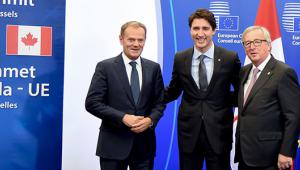It was announced today that the commission has proposed that the deal, known as CETA, should be a “mixed agreement” rather than “EU only”, which was the original intention. Under the latter arrangement, member states’ national parliaments would not have to ratify the deal.
President of the commission Jean-Claude Juncker seems to have succumbed to pressure namely from Germany and France, which objected to their governments not being involved.
While Juncker said he has heeded the concerns of EU heads of state and their parliaments, he warned against delay in ratifying the agreement.
“[CETA] is our best and most progressive trade agreement and I want it to enter in to force as soon as possible,” he said. “I have listened to heads of state for government and to national parliaments. Now it is time to deliver. The credibility of Europe’s trade policy is at stake.”
The commission claims the deal will benefit people and businesses, “big and small”, by scrapping all customs duties between the EU and Canada. The commission also hopes the deal will boost trade, cut costs and create new market access and opportunities for EU companies to bid on Canadian public contracts.
The deal will facilitate the movement of professionals between the EU and Canada by enabling mutual recognition of qualifications, make it easier for service providers to travel between the two countries, and allow for simpler and cheaper tests on products being exported.
“This is an agreement that Europe needs,” stressed EU trade commissioner Cecilia Malmström, calling for the deal to be signed, provisionally applied and concluded quickly.
While she stated that the deal will benefit consumers, workers and entrepreneurs, and uphold European standards in food safety, environmental protection and human rights, many critics disagree.
“Almost three million people across Europe have called on the European Commission to scrap CETA because of the enormous global power grab it represents,” noted Nick Dearden, director of UK campaign group Global Justice Now.
CETA – as well as its cousin, TIPP, brokered between the US and the EU – has drawn much opposition from civil society, the public and wary European governments. They are concerned about a provision that enables companies to sue governments, and the threat to workers’ rights, environmental protections, public services and financial regulation they believe the deals represent.
The commission was also criticised for what was seen as an attempt to fast-track CETA by designating it as ‘EU only’, and to push the deal through in a way that meant the UK would still be party to the agreement despite having voted to leave the EU.
Global Justice Now warned that had the commission presented the deal without deeming it a “mixed agreement”, the deal could have passed in to force early next year.
Britain could still be bound by CETA for 20 years if the deal comes into force before the country leaves the EU, GJN highlighted, leaving it vulnerable to court cases brought by Canadian companies and US subsidies for two decades.
“This isn’t the end of the story,” Dearden said, stating the UK government has been pushing for provisional implementation of CETA.
“This is clearly not acceptable, and we must stop the British government foisting this toxic deal on us before a vote can be led,” he continued.
“It’s testament to the strength of the campaign we have built across Europe against CETA and its US cousin TTIP, that the Commission has been forced to backtrack and allow national parliaments a vote on CETA. Let’s be clear, Brexit does not save Britain from CETA.”
The European Council will now decide whether to give the proposed deal the go-ahead, after which the treaty could be provisionally applied. Signing is due to take place in October, while the process will need the consent of the European parliament and national ratification by all member states to be complete.












